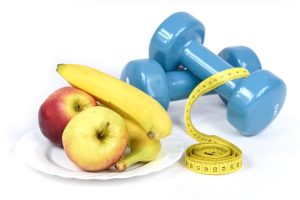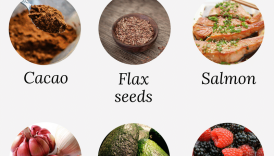Eating Right: The Key to Achieving Your Fitness Goals

Importance of Nutrition
Nutrition plays a vital role in our overall health and well-being. It fuels the body, supports immune function, and is essential for growth and recovery. Just like a car needs the right fuel to run efficiently, our bodies thrive when supplied with the right nutrients.
- Eating Right: The Key to Achieving Your Fitness Goals
- Importance of Nutrition
- Connection between Diet and Fitness
- Setting Your Goals
- Determining Your Caloric Needs
- Establishing a Balanced Diet Plan
- Macronutrients for Fitness
- Protein for Muscle Recovery
- Carbohydrates for Energy
- Micronutrients for Optimal Performance
- Importance of Vitamins in Diet
- Minerals for Hydration and Muscle Function
- Pre-Workout Nutrition Strategies
- Timing of Meals Before Exercise
- Best Foods to Eat Before a Workout
- Post-Workout Recovery Foods
- Protein-Rich Options for Muscle Repair
- Carbohydrates for Glycogen Replenishment
- Hydration for Fitness Success
- Water vs. Sports Drinks
- Importance of Electrolytes
- Snacking for Sustained Energy
- Healthy Snack Ideas
- Avoiding Empty Calories
- Meal Planning Tips for Busy Individuals
- Batch Cooking for Convenience
- Healthy On-The-Go Options
- Tracking Progress and Adjusting Your Diet
- Using Food Journals
- Consulting with a Nutritionist
- Supplements for Fitness Enthusiasts
- Protein Powder Options
- Understanding Pre-Workout Supplements
- The Role of Sleep in Achieving Fitness Goals
- Effects of Sleep on Metabolism
- Importance of Rest and Recovery
- Overcoming Common Nutrition Challenges
- Dealing with Cravings
- Dining Out Smartly
- Long-Term Strategies for Sustaining Healthy Eating Habits
- Setting Realistic Goals
- Building a Support System
- Conclusion
- Recap of Key Points
- Encouragement for Your Fitness Journey
- Energy Production: Balanced nutrition provides the energy needed for daily activities.
- Disease Prevention: A nutrient-rich diet can reduce the risk of chronic illnesses.
- Mental Clarity: Proper nutrition enhances cognitive function and mood.
Connection between Diet and Fitness
The link between diet and fitness is significant. A well-planned diet not only aids in reaching fitness goals but also enhances performance. For example, think of an athlete preparing for a marathon. Their success hinges on both consistent training and proper nutrition. A diet rich in carbohydrates aids in stamina, while protein helps with muscle repair. Here are a few ways diet impacts fitness:
- Energy Levels: High-quality foods boost energy and endurance.
- Muscle Recovery: Nutrients help in quick recovery post-workout.
- Weight Management: Maintaining a healthy diet assists in achieving weight goals.
Investing in nutrition transforms how the body responds to exercise, fortifying the fitness journey from within.
Setting Your Goals
Determining Your Caloric Needs
Setting your fitness goals starts with understanding your caloric needs. Each person’s requirements vary based on factors such as age, weight, activity level, and overall health. To determine your caloric needs, consider these steps:
- Calculate Basal Metabolic Rate (BMR): This is the number of calories your body needs at rest.
- Consider Activity Level: Multiply your BMR by a factor that reflects your daily activity.
- Adjust for Goals: If weight loss is your aim, create a deficit; if muscle gain is the objective, add a surplus.
Finding your caloric sweet spot ensures you’re fueling your body appropriately for your fitness journey.
Establishing a Balanced Diet Plan
Once you know your caloric needs, the next step is to establish a balanced diet plan. This plan should provide a mix of macronutrients—proteins, carbohydrates, and fats. Key components of a balanced diet include:
- Protein: Essential for muscle repair (e.g., chicken, beans, quinoa).
- Carbohydrates: Your main energy source (e.g., whole grains, fruits).
- Healthy Fats: Important for hormone production and absorption of vitamins (e.g., avocados, nuts).
Creating meal plans can simplify this process, helping you stay within your caloric target while enjoying diverse foods. For instance, prepping weekly meals can save time and keep you on track with your nutrition goals. Remember, consistency is key!
Macronutrients for Fitness
Protein for Muscle Recovery
After establishing a nutritional foundation, focusing on macronutrients becomes essential for enhancing fitness performance. Protein, in particular, plays a crucial role in muscle recovery. Here’s why protein should be a cornerstone of your post-workout nutrition:
- Muscle Repair: Consuming protein after a workout helps repair the tiny tears in muscles from intense activity.
- Increase in Muscle Mass: Adequate protein intake is vital for muscle growth, especially for those looking to bulk up.
- Sustained Energy: Protein can help stabilize energy levels, allowing for a more consistent workout routine.
Incorporating sources like chicken, Greek yogurt, or legumes can significantly aid recovery.
Carbohydrates for Energy
Another key macronutrient is carbohydrates, which are essential for maintaining energy levels during workouts. Consider these points about carbs:
- Quick Fuel: Carbohydrates provide a fast source of energy, making them crucial before and during exercise.
- Glycogen Restoration: After exercising, replenishing glycogen stores through carbs is essential to get ready for your next workout.
- Enhanced Endurance: A diet rich in carbohydrates helps improve endurance, allowing you to push harder for longer.
Opt for complex carbs like brown rice, sweet potatoes, and oats for steady energy release. Balancing protein and carbs ensures you maximize your fitness potential while promoting quicker recovery!
Micronutrients for Optimal Performance
Importance of Vitamins in Diet
While macronutrients steal the spotlight in fitness discussions, vitamins are vital for optimal performance. These powerhouses of nutrition support various bodily functions that enhance not only health but also athletic ability. Here’s why vitamins matter:
- Immune Function: Vitamins like A, C, and E bolster your immune system, helping you stay healthy and train consistently.
- Energy Production: B vitamins are crucial for converting food into energy, keeping your workouts energized.
- Muscle Recovery: Antioxidant-rich vitamins help reduce muscle soreness after exercise, ensuring you bounce back faster.
Incorporating colorful fruits and vegetables into your meals is an easy way to meet your vitamin needs.
Minerals for Hydration and Muscle Function
In addition to vitamins, minerals also play a critical role in fitness. Hydration and muscle function hinge on the right mineral intake. Key minerals to focus on include:
- Electrolytes: Sodium, potassium, and magnesium help regulate fluid balance and muscle contractions, crucial during workouts.
- Calcium: Essential for strong bones and muscle contraction, especially essential in weight-bearing exercises.
- Iron: Vital for oxygen transport in the body, which is important for endurance.
Including foods like leafy greens, nuts, and fish can help you achieve balance in your mineral intake. By prioritizing both vitamins and minerals, you can enhance your overall fitness performance!
Pre-Workout Nutrition Strategies
Timing of Meals Before Exercise
With a solid understanding of micronutrients, it’s time to focus on pre-workout nutrition strategies that can significantly boost performance. One critical aspect is meal timing. Eating strategically before your workout can influence your energy levels and endurance. General guidelines include:
- 30 Minutes to 1 Hour Before: Opt for a light snack like a banana or yogurt. Quick-digesting carbs provide instant energy.
- 1 to 3 Hours Before: Enjoy a balanced meal that includes protein, healthy fats, and complex carbohydrates, such as chicken with quinoa and mixed vegetables. This will provide sustained energy for your workout.
Finding the right timing helps you feel fueled without discomfort during your exercise.
Best Foods to Eat Before a Workout
In the realm of pre-workout nutrition, choosing the right foods is essential. Here are some stellar options to consider:
- Oats: A great source of slow-releasing carbohydrates for prolonged energy.
- Greek Yogurt: Packed with protein and probiotics; it’s easily digestible.
- Fruit: Bananas and berries offer quick energy and essential vitamins.
- Whole Grain Toast: Topped with peanut butter, this combo delivers energy and healthy fats.
Experimenting with various foods can help you identify what works best for your body. Ultimately, fueling yourself with the right nutrients before exercise sets the stage for optimal performance and a successful workout session!
Post-Workout Recovery Foods
Protein-Rich Options for Muscle Repair
After putting in the effort during your workout, it’s crucial to focus on post-workout nutrition to aid recovery. Protein-rich foods are essential for muscle repair and growth. Consider these options:
- Grilled Chicken: A lean source of protein that promotes muscle recovery.
- Protein Shakes: Convenient and effective, they provide a quick dose of protein right after exercise.
- Cottage Cheese: Packed with casein protein, it’s excellent for sustained muscle repair overnight.
Adding these protein-rich foods into your post-workout routine helps maximize recovery and prepare your muscles for the next session.
Carbohydrates for Glycogen Replenishment
Along with protein, carbohydrates play a vital role in replenishing glycogen stores depleted during exercise. Refueling with carbs ensures your energy levels are restored for future workouts. Here are some great carbohydrate options:
- Sweet Potatoes: Packed with healthy carbs and nutrients for energy replenishment.
- Brown Rice: A great source of complex carbohydrates to refill glycogen stores.
- Fruits: Such as bananas or apples, which are not only hydrating but also provide quick energy.
Balancing protein and carbohydrates post-workout optimizes recovery, ensuring you’re ready and energized for your next fitness challenge!
Hydration for Fitness Success
Water vs. Sports Drinks
As you focus on recovery after an intense workout, hydration becomes equally vital for fitness success. One question often arises: should you stick to water or reach for sports drinks?
- Water: Ideal for most workouts, it effectively hydrates and supports overall health, especially for light to moderate exercise.
- Sports Drinks: These can be beneficial for high-intensity or prolonged activities because they contain electrolytes and carbohydrates, helping replenish lost fluids and energy.
Choosing the right option depends on the type and duration of your workout. Listening to your body is key!
Importance of Electrolytes
In conjunction with hydration, electrolytes are crucial for maintaining fluid balance and muscle function during exercise. Consider these essential electrolytes:
- Sodium: Helps retain fluids, vital during intense exercises.
- Potassium: Supports muscle contractions and prevents cramping.
- Magnesium: Aids in energy production and muscle recovery.
Incorporating electrolyte-rich foods like bananas, spinach, or even a pinch of salt in your meals can enhance hydration and performance. Making hydration a priority, alongside the right nutrients, prepares you for fitness success and optimal performance!
Snacking for Sustained Energy
Healthy Snack Ideas
As you continue your journey to fitness success, incorporating healthy snacks can play a pivotal role in maintaining sustained energy throughout the day. Rather than letting hunger dictate your choices, here are some nutritious snack ideas:
- Nuts: Almonds or walnuts provide healthy fats, protein, and fiber.
- Greek Yogurt with Honey: This combination offers protein, probiotics, and a touch of natural sweetness.
- Veggies and Hummus: Crunchy carrots or bell peppers paired with hummus make for a satisfying and nutrient-rich snack.
- Rice Cakes with Avocado: Light yet filling, this snack is packed with good fats and fiber.
Choosing the right snacks can keep you energized and focused.
Avoiding Empty Calories
While indulging in snacks can be delightful, avoiding empty calories is crucial for achieving your fitness goals. Empty calories come from foods that offer little nutritional value, such as:
- Sugary Snacks: Candy bars and pastries provide quick energy but lead to crashes later.
- Processed Foods: Chips and sugary drinks may satisfy temporarily but lack essential nutrients.
- Fast Food: Often high in unhealthy fats and sugar, they deliver fleeting pleasure without lasting benefits.
Being mindful of your snack choices can help you fuel your body effectively, keeping you energized and on track with your fitness journey!
Meal Planning Tips for Busy Individuals
Batch Cooking for Convenience
For those balancing a busy schedule while striving for fitness goals, meal planning becomes essential. One highly effective strategy is batch cooking. Preparing meals in advance not only saves time but also helps ensure you’re eating healthier options throughout the week. Here’s how to get started:
- Choose a Day: Set aside a specific day each week for meal prep, perhaps a Sunday afternoon.
- Select Recipes: Focus on versatile recipes that can be reused, like soups, stews, or grain bowls.
- Portion and Store: Use airtight containers to store individual portions for easy access.
Batch cooking ensures that nutritious meals are ready when cravings hit or schedules get hectic.
Healthy On-The-Go Options
Despite the best intentions, busy lifestyles can sometimes lead to unhealthy eating choices. To prevent this, having healthy on-the-go options available is crucial. Consider these practical ideas:
- Pre-Packaged Nuts: An easy source of protein and healthy fats—great for quick energy boosts.
- Fruit Packs: Small containers of cut-up fruits like apple slices or berries make for refreshing snacks.
- Protein Bars: Opt for bars with whole ingredients to sustain energy without added sugars.
Keeping these healthy snacks on hand allows you to resist the temptation of fast food or processed snacks, keeping you fuelled and focused on your fitness journey!
Tracking Progress and Adjusting Your Diet
Using Food Journals
As you navigate your fitness journey, tracking your progress and adjusting your diet is essential to achieving your goals. One effective method for this is utilizing a food journal. Keeping track of what you eat not only increases mindfulness but also provides insights into your dietary patterns. Consider these tips for maintaining a food journal:
- Daily Entries: Log your meals, snacks, and beverages each day to monitor nutritional intake.
- Note Feelings: Record how certain foods make you feel, which can help identify what works best for your body.
- Track Progress: Keep an eye on how your eating habits correlate with fitness improvements or changes in energy levels.
By reflecting on this data, you can make informed adjustments.
Consulting with a Nutritionist
While food journaling can be incredibly beneficial, consulting with a nutritionist takes your dietary journey to the next level. Here’s why working with a nutritionist can make a difference:
- Personalized Plans: A nutritionist can create tailored meal plans based on your specific needs, goals, and preferences.
- Expert Advice: They offer professional insights into nutrition science, helping you overcome dietary challenges.
- Support System: Regular check-ins can keep you motivated and accountable.
Building a collaboration with a nutritionist can instill confidence in your dietary choices, ensuring you’re on the right track toward achieving your fitness aspirations!
Supplements for Fitness Enthusiasts
Protein Powder Options
As you refine your nutrition strategy, incorporating supplements can be quite beneficial for fitness enthusiasts. One of the most popular supplements is protein powder. It provides a convenient way to meet protein needs, especially after workouts. Here are some common options:
- Whey Protein: Fast-digesting and ideal for post-workout recovery, great for muscle repair.
- Casein Protein: Slower-digesting, perfect for nighttime use to support muscle recovery during sleep.
- Plant-based Proteins: Options like pea, hemp, or rice protein cater to those who prefer vegan sources.
With so many choices available, selecting the right protein powder can help enhance your recovery and muscle growth.
Understanding Pre-Workout Supplements
Another avenue to explore in the realm of fitness supplements is pre-workout formulas. These are designed to boost energy, focus, and performance during workouts. Key elements to consider:
- Caffeine: A common ingredient that increases energy and improves endurance.
- BCAAs (Branched-Chain Amino Acids): Help reduce muscle soreness and fatigue by providing essential amino acids.
- Creatine: Supports high-intensity outputs and can enhance strength and recovery.
Before diving into pre-workout supplements, it’s wise to assess your individual needs and goals. With a focus on the right types of supplements, you can maximize your fitness gains and elevate your performance to new heights!
The Role of Sleep in Achieving Fitness Goals
Effects of Sleep on Metabolism
As you further your journey toward fitness, it’s crucial to consider the often overlooked role of sleep. Adequate sleep significantly impacts metabolism and overall wellness. When you don’t get enough rest, your body can struggle to regulate hormones that control hunger and appetite—leading to potential weight gain. Key aspects include:
- Insulin Sensitivity: Lack of sleep can decrease insulin sensitivity, making it harder to manage blood sugar levels.
- Energy Expenditure: Quality sleep promotes more effective calorie burning, aiding weight management.
Prioritizing sleep can enhance your metabolic function and support fitness achievements.
Importance of Rest and Recovery
In addition to metabolic benefits, sleep enhances your body’s rest and recovery processes. It is during sleep that muscle repair occurs, and energy stores are replenished, which are crucial for optimal performance in workouts. Consider these benefits of quality rest:
- Muscle Growth: Growth hormone is released during deep sleep, contributing to muscle repair and growth.
- Reduced Injury Risk: Proper rest helps lower cortisol levels, minimizing stress-related injuries.
- Improved Performance: Good sleep enhances focus, reaction time, and endurance during workouts.
By recognizing the importance of sleep, you can significantly improve your fitness journey, ensuring that your body is well-rested, primed for success, and ready to tackle challenges!
Overcoming Common Nutrition Challenges
Dealing with Cravings
As you continue on your fitness journey, encountering cravings is inevitable. Rather than resisting them entirely, adopting effective strategies to manage cravings can keep you on track. Here are some practical tips:
- Stay Hydrated: Sometimes, thirst can be mistaken for hunger. Drinking water can help curb cravings.
- Healthy Alternatives: Opt for healthier snacks that satisfy your cravings, like dark chocolate for a sweet tooth or carrot sticks with hummus for a crunchy fix.
- Moderation: Allow yourself a small portion of your favorite treat occasionally to avoid feeling deprived.
These strategies can help you maintain balance while enjoying the foods you love!
Dining Out Smartly
Navigating social events or dining out can pose challenges for maintaining good nutrition. However, making informed choices can help you stay on track without feeling restricted. Consider these tips:
- Check Menus in Advance: This allows you to plan and choose healthier options before arriving.
- Portion Control: Don’t hesitate to share an entrée or request a half-portion to avoid overeating.
- Choose Wisely: Opt for grilled, baked, or steamed options rather than fried. Also, ask for dressings and sauces on the side to control calories.
By being proactive while dining out, you can enjoy social occasions without compromising your nutrition goals, ensuring a successful path forward in your fitness journey!
Long-Term Strategies for Sustaining Healthy Eating Habits
Setting Realistic Goals
As you embark on your journey toward healthier eating habits, it’s crucial to set realistic goals. Aiming for achievable and specific objectives can increase your chance of long-term success. Consider these tips for effective goal setting:
- SMART Goals: Ensure your goals are Specific, Measurable, Achievable, Relevant, and Time-bound. For example, “I will eat at least three servings of vegetables each day” is a clear and attainable goal.
- Start Small: Begin with minor changes, like incorporating one healthy meal per day, to create sustainable habits.
- Track Progress: Regularly monitor your achievements to stay motivated and make necessary adjustments.
By setting realistic goals, you lay a strong foundation for lasting changes.
Building a Support System
Another vital aspect of maintaining healthy eating habits is building a support system. Surrounding yourself with like-minded individuals can provide accountability and motivation. Here are ways to create a supportive network:
- Share Your Goals: Tell friends and family about your healthy eating objectives. Their encouragement can make a big difference.
- Join a Community: Consider joining a fitness class or an online group focused on nutrition to connect with others on the same path.
- Be an Encouragement Yourself: Support others in their goals, creating a reciprocal relationship that fosters accountability.
Building a robust support system creates a sense of camaraderie while reinforcing your commitment to healthy eating, ensuring long-term success in your wellness journey!
Conclusion
Recap of Key Points
As we conclude this journey through nutrition and fitness, let’s recap the essential points that can guide you toward success:
- Balanced Nutrition: Prioritize a diet rich in macronutrients and micronutrients to support your goals.
- Smart Meal Planning: Utilize batch cooking and healthy snack options to stay on track.
- Hydration Matters: Remember the importance of fluids and electrolytes for optimal performance.
- Rest and Recovery: Never underestimate the role of sleep and downtime in reaching your fitness objectives.
These strategies can significantly impact your overall health and performance.
Encouragement for Your Fitness Journey
Embarking on a fitness journey is a personal choice, filled with challenges and triumphs. It’s important to remember that progress takes time. Celebrate small victories along the way and don’t be discouraged by setbacks.
- Stay Consistent: Consistency outweighs perfection; small, sustainable changes often yield the best results.
- Find Joy: Engage in activities you enjoy to keep your motivation high.
- Seek Support: Connect with friends, family, or a community to lift each other up.
Trust the process, believe in your capability, and remember that every step forward is a step towards a healthier, happier you!



